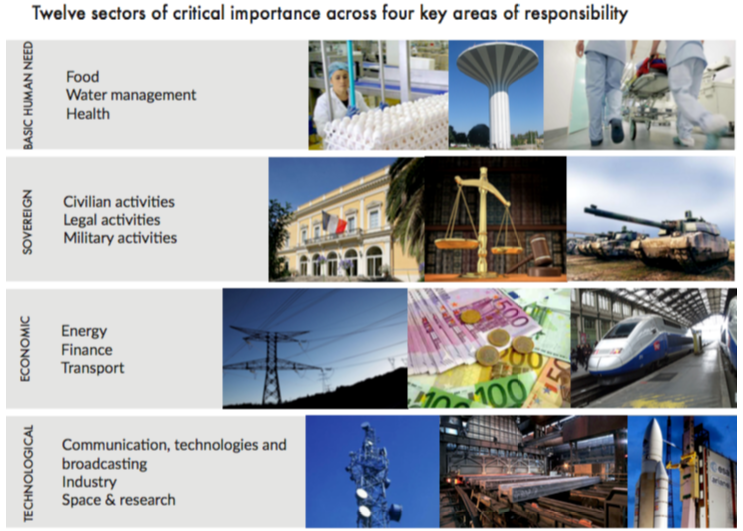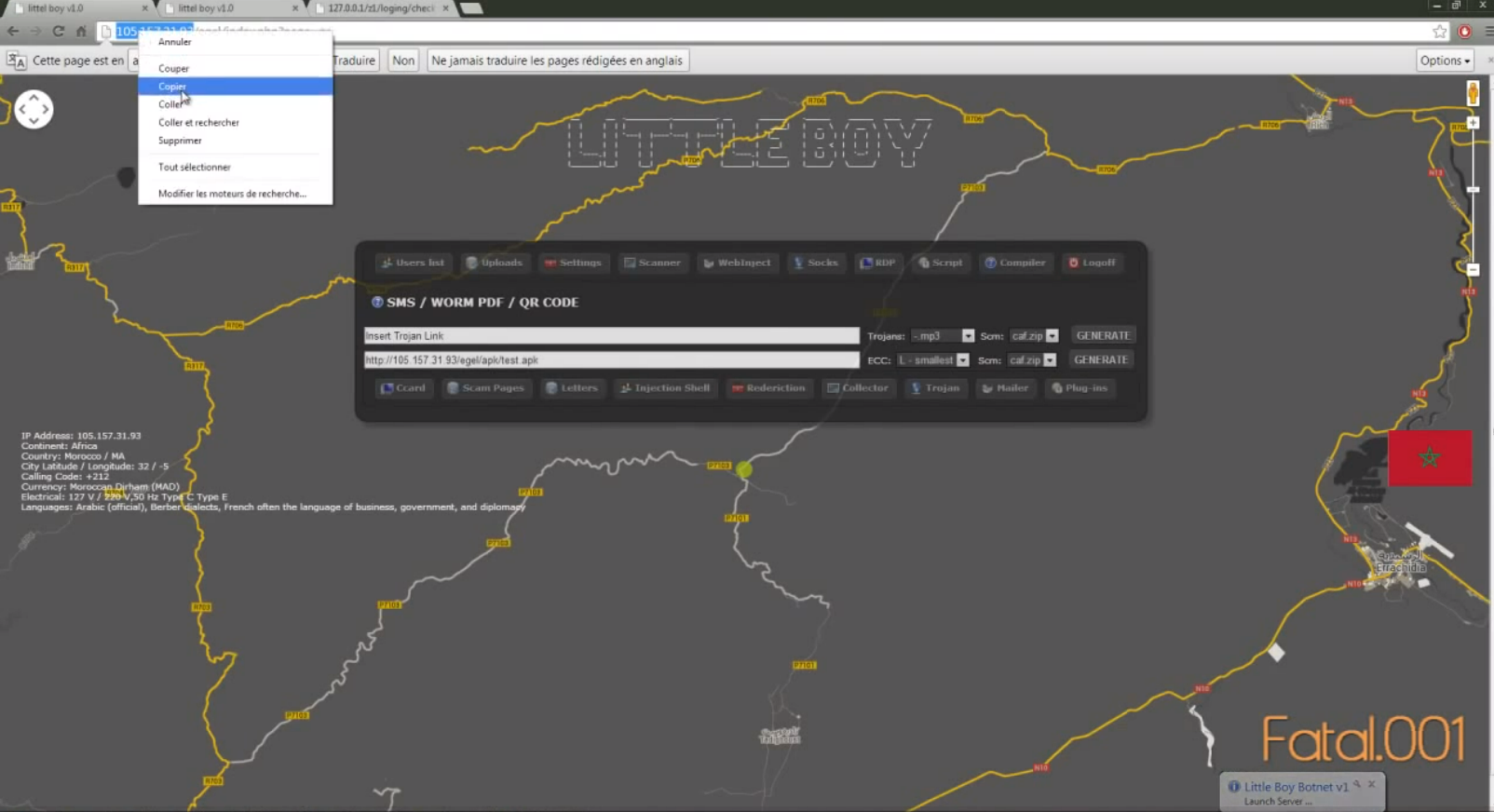A large number of French critical infrastructure firms were hacked as part of an extended malware campaign that appears to have been orchestrated by at least one attacker based in Morocco, KrebsOnSecurity has learned. An individual thought to be involved has earned accolades from the likes of Apple, Dell, and Microsoft for helping to find and fix security vulnerabilities in their products.

In 2018, security intelligence firm HYAS discovered a malware network communicating with systems inside of a French national power company. The malware was identified as a version of the remote access trojan (RAT) known as njRAT, which has been used against millions of targets globally with a focus on victims in the Middle East.
Further investigation revealed the electricity provider was just one of many French critical infrastructure firms that had systems beaconing home to the malware network’s control center.
Other victims included one of France’s largest hospital systems; a French automobile manufacturer; a major French bank; companies that work with or manage networks for French postal and transportation systems; a domestic firm that operates a number of airports in France; a state-owned railway company; and multiple nuclear research facilities.
HYAS said it quickly notified the French national computer emergency team and the FBI about its findings, which pointed to a dynamic domain name system (DNS) provider on which the purveyors of this attack campaign relied for their various malware servers.
When it didn’t hear from French authorities after almost a week, HYAS asked the dynamic DNS provider to “sinkhole” the malware network’s control servers. Sinkholing is a practice by which researchers assume control over a malware network’s domains, redirecting any traffic flowing to those systems to a server the researchers control.
While sinkholing doesn’t clean up infected systems, it can prevent the attackers from continuing to harvest data from infected PCs or sending them new commands and malware updates. HYAS found that despite its notifications to the French authorities, some of the apparently infected systems were still attempting to contact the sinkholed control networks up until late 2019.
“Due to our remote visibility it is impossible for us to determine if the malware infections have been contained within the [affected] organizations,” HYAS wrote in a report summarizing their findings. “It is possible that an infected computer is beaconing, but is unable to egress to the command and control due to outbound firewall restrictions.”

About the only French critical infrastructure vertical not touched by the Kasbah hackers was the water management sector.
HYAS said given the entities compromised — and that only a handful of known compromises occurred outside of France — there’s a strong possibility this was the result of an orchestrated phishing campaign targeting French infrastructure firms. It also concluded the domains associated with this campaign were very likely controlled by a group of adversaries based in Morocco.
“What caught our attention was the nature of the victims and the fact that there were no other observed compromises outside of France,” said Sasha Angus, vice president of intelligence for HYAS. “With the exception of water management, when looking at the organizations involved, each fell within one of the verticals in France’s critical infrastructure strategic plan. While we couldn’t rule out financial crime as the actor’s potential motive, it didn’t appear that the actor leveraged any normal financial crime tools.”
‘FATAL’ ERROR
HYAS said the dynamic DNS provider shared information showing that one of the email addresses used to register a key DNS server for the malware network was tied to a domain for a legitimate business based in Morocco.
According to historic records maintained by Domaintools.com [an advertiser on this site], that email address — ing.equipepro@gmail.com — was used in 2016 to register the Web site talainine.com, a now-defunct business that offered recreational vehicle-based camping excursions just outside of a city in southern Morocco called Guelmim.
Archived copies of talainine.com indicate the business was managed by two individuals, including someone named Yassine Algangaf. A Google search for that name reveals a similarly named individual has been credited by a number of major software companies — including Apple, Dell and Microsoft — with reporting security vulnerabilities in their products.
A search on this name at Facebook turned up a page for another now-defunct business called Yamosoft.com that lists Algangaf as an owner. A cached copy of Yamosoft.com at archive.org says it was a Moroccan computer security service that specialized in security audits, computer hacking investigations, penetration testing and source code review.
A search on the ing.equipepro@gmail.com address at 4iq.com — a service that indexes account details like usernames and passwords exposed in Web site data breaches — shows this email address was used to register an account at the computer hacking forum cracked[.]to for a user named “fatal.001.”
A LinkedIn profile for a Yassine Algangaf says he’s a penetration tester from the Guelmim province of Morocco. Yet another LinkedIn profile under the same name and location says he is a freelance programmer and penetration tester. Both profiles include the phrase “attack prevention mechanisms researcher security tools proof of concepts developer” in the description of the user’s job experience.
Searching for this phrase in Google turns up another Facebook page, this time for a “Yassine Majidi,” under the profile name “FatalW01.” A review of Majidi’s Facebook profile shows that phrase as his tag line, and that he has signed several of his posts over the years as “Fatal.001.”
There are also two different Skype accounts registered to the ing.equipepro.com email address, one for Yassine Majidi and another for Yassine Algangaf. There is a third Skype account nicknamed “Fatal.001” that is tied to the same phone number included on talainine.com as a contact number for Yassine Algangaf (+212611604438). A video on Majidi’s Facebook page shows him logged in to the “Fatal.001” Skype account.
On his Facebook profile, Majidi includes screen shots of several emails from software companies thanking him for reporting vulnerabilities in their products. Fatal.001 was an active member on dev-point[.]com, an Arabic-language computer hacking forum. Throughout multiple posts, Fatal.001 discusses his work in developing spam tools and RAT malware.
In this two-hour Arabic language YouTube tutorial from 2014, Fatal.001 explains how to use a RAT he developed called “Little Boy” to steal credit card numbers and passwords from victims. The main control screen for the Little Boy botnet interface includes a map of Morocco.
Reached via LinkedIn, Algangaf confirmed he used the pseudonyms Majidi and Fatal.001 for his security research and bug hunting. But he denied ever participating in illegal hacking activities. He acknowledged that ing.equipepro@gmail.com is his email address, but claims the email account was hacked at some point in 2017.
“It has already been hacked and recovered after a certain period,” Algangaf said. “Since I am a security researcher, I publish from time to time a set of blogs aimed at raising awareness of potential security risks.”
As for the notion that he has somehow been developing hacking programs for years, Algangaf says this, also, is untrue. He said he never sold any copies of the Little Boy botnet, and that this was one of several tools he created for raising awareness.
“In 2013, I developed a platform for security research through which penetration test can be done for phones and computers,” Algangaf said. “It contained concepts that could benefit from a controlled domain. As for the fact that unlawful attacks were carried out on others, it is impossible because I simply have no interest in blackhat [activities].”






Great job as always, Brian
Their is some pretty good research done here.
Sharif don’t like it!
Well, that’s what happens when your priorities Clash. +1 for another reference to the 80’s music Brian!
France should present you with a Legion of Honor for the work you have done to help pull their chestnuts out of this Moroccan fire. You’ve practically handed their secret service all the info they need to know. Great work!
These guys in most middle Eastern countries can shake your hand and be your best friend during the day, and then at night open fire at you from their AK-47. This is what my friend tells me, that served in Iraq. I bet it goes the same way with hacking and writing malware.
…funny they say the same thing about us…
Unless something has changed recently, the last time I checked Morocco was in Africa, Not the Middle East
Last time I checked, Morocco was in Africa. Not the Middle East.
Yeah last time I checked, Morrocco is part of the Arab world, which includes the Middle East and North Africa, otherwise known as MENA.
Morocco is not in the Middle East and we don’t have AK47’s here. Our military uses mostly Western weapons and guns are strictly controlled for the rest of the population.
I don’t know where you’re from, but here in Morocco people going around shooting other people with automatic weapons is not customary.
Dynamic DNS providers have a legitimate use, but they aid hackers so much. I have a perl script in my postfix to detect detect reverse pointers that appear to be dynamic.
I went on YouTube and played the old “Rock The Kasbah” video. Still great after all these years. It will be in my head all day.
True story…I got totally pwned by a Moroccan hacker. The event is what eventually led to my self hosting web and email.
Thanks for another great article.
Hi Brian, just a tip: The bot is VertexNet (from DarkCoderSc, DarkComet author) and poorly stripped
Algangaf said ing.equipepro@gmail.com was hacked in 2017 when the cracked[.]to breach occurred in July 2019 according to HaveIbeenPwned.com .
Who recovers an compromised email account and keeps on using it to logon to hackers forum and security purposes ?
> [pathetic list of companies with incompetent IT security]
It has been a quarter of a century since network security became a real issue for most companies. That’s more than a whole generation of admins and managers who have failed at keeping their organization’s data secure.
I no longer have any sympathy for any of those people, and I hope the people who have been inconvenienced by their failure get lawyers and sue everything vaguely connected with it.
Obviously decades of warnings, policies, and even government hand-slapping have failed to clue them in. Perhaps hitting them in the wallet will make them start cranking things down.
> DNS provider sinkhole
I guess pointing their own routers to a Pi Hole was too much trouble…
Don’t blame the admins and managers. Blame the company execs. In my experience, the admins know perfectly what to do, but cannot get the funding for better equipment and personnel. Security just isn’t “sexy enough”, and visible enough when it is doing its job properly.
The above does not apply to outsource IT firms 🙂
I first wore the +10 Spiked Jackboots of network security back in 1996. I’m long out of date on corporate security management now… but even back then it was obvious that security was something you had to build in from the start, not some kind of pixie dust you sprinkled over things afterward.
It seems that “security” now consists mainly of assuming you’re going to be breached no matter what, and having some kind of plan to deal with the fallout. From several publicized attacks, some of those companies don’t even have freakin’ *backups*, much less anything resembling “security.”
Algangaf does not sound like Moroccan last name. I highly doubt it’s real.
Could it be a French secret service penetration test operation? And that they didn’t want to share with US, due to Trump leaking secret info?